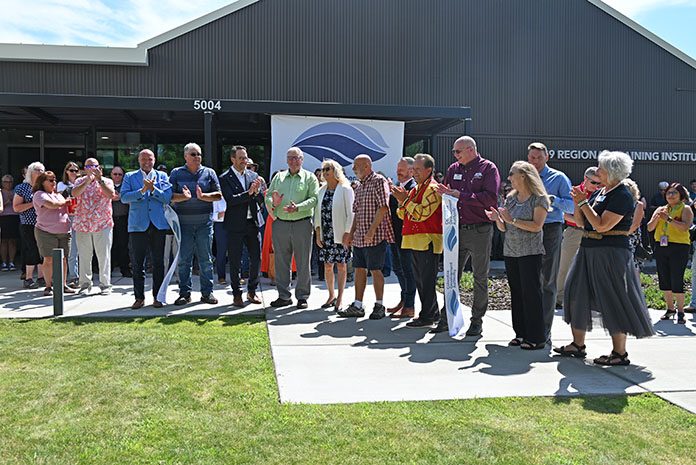
Columbia Development Authority Executive Director Greg Smith put his five-member board on notice the CDA needs revenue to meet obligations.
“I want to be very candid with all five of you,” said. “We need some decisions made. We’re behind on where we ought to be because the five board members will not give me direction.”
During the same meeting Tuesday, April 23, at the Stafford Hansell Government Center in Hermiston, one of the newest CDA Board members argued the lack of planning has created the situation. And John Shafer, CDA Board member and Umatilla County commissioner, pushed to have the board rescind its 3-2 vote from March 26 to give the CDA’s industrial lands to the ports of Morrow and Umatilla.
Smith told the board the CDA has obligations and deadlines it must meet, such as a project to preserve a portion of the Oregon Trail on the CDA lands, which belonged to the U.S. Army, and create enhancements there, including period fencing and a picnic area. Smith after the meeting said the project cost is about $750,000, but there’s no money in the CDA budget for the project, which is due Sept. 1.
“Just from the fiduciary perspective as your executive director, I got to take care of this property,” Smith told the board. “I need to make sure we have adequate insurance. I need to make sure we have security when someone decides to drive through the gate, which has happened twice since our ownership. I need to be able to take care of that, and right now I don’t have the financial resources to do it.”
To meet the CDA’s financial needs, Smith suggested the board consider selling 100 acres at $60,000-$70,000 per acre. That would net at least $6 million and keep the CDA in the black for four years and maybe as long as five.
He also said there is a viable buyer that has been before the CDA Board numerous times but will not come again unless the CDA meets certain conditions.
Shafer said coming to a decision to sell the land would be easier if the CDA Board rescinded the March 26 vote.
“Because as far as I’m concerned, with Umatilla County being effectively kicked out of any ownership plans, I don’t see why Umatilla County would be on the hook paying any of that outstanding debt,” he said.
But Kim Puzey, general manager of the Port of Umatilla, and CDA Board chair, said he had “no appetite to rescind the vote,” and the matter went no further.
JD Tovey, deputy executive director of the Confederated Tribes of the Umatilla Indian Reservation, said while he was new to the CDA Board, the organization should have an operating budget relying on revenue or regular member contributions instead of asking members for money whenever the board takes action. He also said selling the land does not feel proactive or planned.
“I think many of the things you’re stating are very correct,” Smith said. “The challenge staff has is we’re trying to figure out how to budget with no revenue.”
Puzey and other board members said it would be helpful to have a budget process, although the CDA bylaws do not call for a budget.
“I hear you loud and clear on wanting a budget. I hear that,” Smith said. “But I also come to board meetings every month with great ideas thrown at staff. And that costs money, and I don’t have the resources to accomplish that.”
Smith explained the CDA relies on a grant of $1 million a year from the Office of Local Defense Community Cooperation, formerly the Office Of Economic Adjustment. But since the Army has transferred the lands to local control, that funding will step down 50% in the next budget cycle and then down to zero. He said selling the 100 acres would solve the problem.
Puzey said the board still needs to sort through some matters, including whether the CDA controls the 100 acres or if the ports now own that land and would control its sale.
Tovey said it “would have been really nice” if the board had made those decisions before the March vote. He said he is looking at a bigger picture. He said it seems the CDA is in this revenue bind because of a lack of strategic planning. Smith said that was not correct and staff has worked diligently this past year on a plan, which Tovey’s predecessor had requested.
“My question is,” Tovey said, “do we have a five-year strategic plan?
Smith replied, “No. No.”
Puzey asked Smith to make budgets based on a five-way split of entities on the board and another on a split between just the two ports.
Shafer asked about scheduling a meeting to rescind the vote. Puzey said he had no desire to rescind the vote. Shafer asked Smith if he talked with an attorney about the vote.
Smith said he would share the memo he received from attorney Elizabeth E. Howard with the law firm Schwabe, Williamson & Wyatt P.C. on the transfer of depot lands. Shafer asked for a copy. The East Oregonian obtained a copy of the eight-page memo, which analyzes the transfers of CDA lands to one or more member entities comprising CDA.
Puzey said he hoped the CDA could move forward.
“We have a massive chore ahead of us to be able to do the strategic planning, the infrastructure development and so forth before we can start looking at citing entities out there,” he said. “We have a lot of work to do.”
As the meeting ended, Smith stressed to the board the pressure it is under.
“We have obligations that need to be met, and timelines that go with those obligations,” Smith said. And I’m very uneasy that we’ll be able to make those.”










